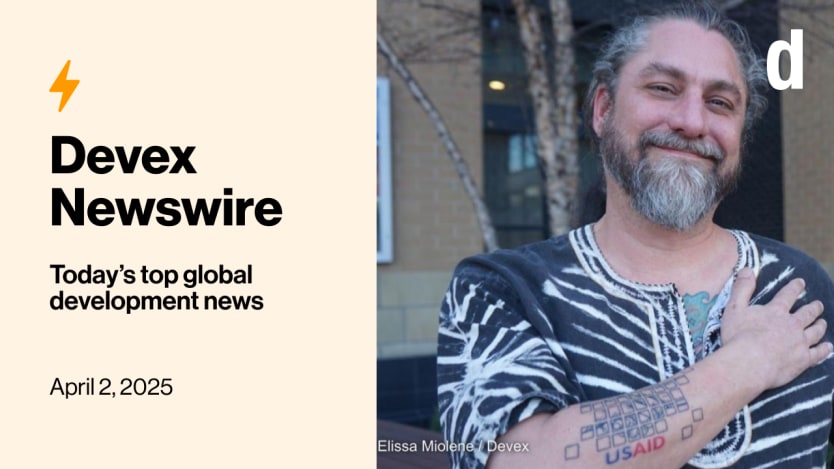Devex Newswire: The quest to preserve a USAID memorial, in ink and paint
Presented by data.org

USAID’s memorial in Washington, D.C., honors fallen aid workers, but faces an uncertain fate amid political cuts. Now a bold campaign to preserve its legacy via public art is afoot.
Also in today’s edition: The step by step of dismantling USIP, and how USAID cuts impact multilaterals.
+ Join us today at 9.30 a.m. ET (2.30 p.m. British Summer Time) for a live conversation with Simon Meier, head of BII Plus at British International Investment, as we unpack how technical assistance is being used to unlock deals, strengthen investees, and create new partnership opportunities. Learn how your organization can engage with DFIs to deliver impact — and funding — on the ground. Save your spot now.
Memory loss
Tucked away in the U.S. Agency for International Development’s D.C. headquarters is a memorial wall that has stood for decades, bearing the names of those who died while working for what was once a global aid powerhouse. Each tile and name whispers tales of courage and sacrifice, from Edward Hines' plane crash in Vietnam in 1972 to Andrew Tombe's execution in Sudan in 1992.
This is a preview of Newswire
Sign up to this newsletter for an inside look at the biggest stories in global development, in your inbox daily.
The memorial faces an uncertain future under the Trump administration's sweeping cuts to USAID. “It’s only a matter of time,” worried Shawn Siochain, a veteran of USAID-funded projects, echoing the fears of many as the agency seemed to vanish before their eyes.
In an act of defiance and remembrance, Siochain, now jobless, is on a mission to preserve the spirit of USAID. Amid fears of erasure, he envisions a vibrant mural in D.C. to immortalize the agency's impactful history — not just as a somber list of names, but as a vivid tableau of its global influence, featuring scenes such as a child receiving a polio vaccine and a USAID worker in action, my colleague Elissa Miolene writes.
“USAID is being erased, in many ways as if it never existed,” says a current USAID staffer, opting to stay anonymous. Despite the chilling proclamation by Elon Musk, who called USAID a “criminal organization” and cheered for its demise, the memorial remains intact but its future hangs by a thread.
Unwilling to let the legacy fade, Siochain took an extraordinary step — he tattooed the memorial on his arm, a personal tribute to a cause much bigger than any individual. He recalls the profound impact of his first encounter with the memorial, a stark reminder of the risks and rewards of humanitarian work.
Now, Siochain scours the city for the perfect wall to host his mural, a tribute to both the lost and the lasting impact of USAID.
“[As humanitarian workers] we knew the risks,” Siochain reflects. “But fast forward to now, and we never knew that the risk would be our own government abandoning us.”
Read: One aid worker’s fight to honor USAID’s legacy
+ Can you ace our monthly news quiz on the top headlines from March? Take our quiz!
Swift eviction
In a whirlwind first move, 28-year-old Nate Cavanaugh, new head of the U.S. Institute of Peace, is shutting down its $500 million D.C. headquarters. “I have determined that USIP no longer needs the property,” he wrote to the agency that runs the building — right after firing nearly all 300 staffers and giving them until April 7 to pack up.
“The analogy of a bull in a China shop comes to mind,” says Judge Beryl Howell, as the government confirmed the building’s been handed off to the Department of Labor. Why? Brian Hudak, the government’s lawyer, wasn’t sure.
Cavanaugh argued the building costs too much, USIP had “strayed far from its original mandate,” and Trump wanted it scaled back. By the time USIP tried to stop the handover, it was basically done. GSA had already claimed the building, the desks, the laptops — possibly even the $80 million endowment.
No one seems to know why Cavanaugh — a tech entrepreneur with no peacebuilding background — got the top job. Even the government’s lawyer just says he was “a successful entrepreneur.” The previous leadership? Swept out by Secretary of State Marco Rubio, Secretary of Defense Pete Hegseth, and President of the National Defense University Peter Garvin. Cavanaugh was then installed as USIP president after a game of musical chairs, Elissa writes.
Now, a court ruling is pending — and Musk has weighed in, posting on his social media platform X: “Any government institution is most likely to be the opposite of its name.” Also, USIP’s website? Gone. So a claim, reposted by Musk, that the USIP funneled $132,000 to a former Taliban member and $1.3 million to an Iraqi youth group cannot be verified as the USIP website has been taken down.
Read: US Institute of Peace headquarters transferred to Labor Department
And the multilaterals?
Devex is slicing through the layers of recent USAID cuts to understand their effect on the multilateral system. In our deep dive, Devex analyst Miguel Antonio Tamonan discovered that 17 big-name organizations got hit, including 14 U.N. agencies.
Also feeling the sting were vaccine alliance Gavi and the World Bank’s International Bank for Reconstruction and Development. Miguel crunched some numbers and found these 17 agencies’ cumulative loss amounted to nearly $4.1 billion.
The main culprits? A mix of “obligated” funds, which are promised but not yet necessarily spent, and “unobligated” funds, which are potential future commitments now axed. This means big changes and potentially big setbacks for global initiatives, from vaccine rollouts to peace operations.
We’ll dive deeper into what’s left and what’s lost in the coming days.
Read: Which multilaterals are hit most by USAID terminations? (Pro)
+ Not yet a Devex Pro member? Start your 15-day free trial today to access all our expert analyses, insider insights, funding data, events, and more. Check out all the exclusive content available to you.
Global reckoning
As U.S. President Donald Trump began his second term by exiting the Paris Agreement, the climate community faces a major upheaval. His push for fossil fuels over renewable energy has sparked both concern and mobilization.
“It is a worrying time because some countries are being ambivalent about how to deal with the climate problem when what you need is strong political will and action — driven from all countries and all sectors — to meet the goals of the Paris Agreement,” says Sandeep Sengupta of the International Union for Conservation of Nature.
This shift has led to the cancellation of over 130 U.S. climate-related foreign aid contracts, affecting projects globally and slashing U.N. climate funding by 21%. With USAID's climate funding also at risk, job cuts and project reductions loom, Devex contributing reporter Rebecca Root writes.
Despite these setbacks, environmental consultant Ro Hill encourages resilience: “You just have to look across the planet and see how many good people are working on solutions ... and be inspired by that. We have to recognize and strengthen and support and not give in to despair,” she states.
Read: How climate change workers feel under Trump 2.0 (Career)
+ Sign up for a Devex Career Account membership today to unlock all our exclusive career resources and get full access to the world’s largest global development job board. We offer a 15-day free trial.
In other news
Former envoys Richard Grenell and David Friedman are among those considered to become U.S. ambassador to the U.N., after Elise Stefanik’s nomination has been withdrawn. [Reuters]
A study by Australian scientists reveals that an increase of 4 degrees Celsius in global temperature has the economic impact of making the average person poorer by 40%. [The Guardian]
More than 300 children are dead and at least 600 injured since the Israeli offensive in Gaza restarted two weeks ago, according to UNICEF. [BBC]
Sign up to Newswire for an inside look at the biggest stories in global development.
Search for articles
Most Read
- 1
- 2
- 3
- 4
- 5








